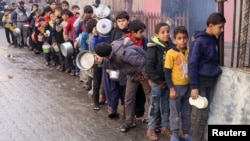ເຈົ້າໜ້າທີ່ອົງການອະນາໄມໂລກກ່າວເຕືອນວ່າ ວິກິດການດ້ານມະນຸດສະທຳ ແລະສຸຂະພາບທີ່ພວມເກີດຂຶ້ນຢູ່ໃນເຂດກາຊາ ແມ່ນເປັນລະເບີດເວລາທີ່ຈະພາໃຫ້ມີຜູ້ເສຍຊີວິດຈຳນວນຫຼາຍຈາກຄວາມອຶດຫິວ, ການຂາດນໍ້າ ແລະການລະບາດຂອງພະຍາດຕິດແປດ.
ທ່ານຊອນ ເຄຊີ (Sean Casey), ຜູ້ປະສານງານທີມແພດສຸກເສີນຂອງອົງການອະນາໄມໂລກ ກ່າວວ່າ “ມັນຊ້າເກີນໄປແລ້ວ ,” “ບໍ່ມີອາຫານພຽງພໍ. ທຸກຄົນທີ່ຂ້າພະເຈົ້າເວົ້ານຳ, ທຸກຄົນໃນ ເຂດກາຊາ ຕ່າງກໍຫິວໂຫຍ. ພວກເຮົາກໍາລັງຮັບມືກັບພວກຄົນທີ່ຫິວໂຫຍ.
“ມັນເປັນສິ່ງທີ່ຮັບບໍ່ໄດ້. ທຸກໆບ່ອນທີ່ພວກເຮົາໄປ, ມີຄົນມາຂໍອາຫານຈາກພວກເຮົາ —ແມ້ແຕ່ຢູ່ໃນໂຮງໝໍທີ່ພວກເຮົາໄປ, … ຖ້າອັນນັ້ນບໍ່ແມ່ນຕົວຊີ້ບອກເຖິງຄວາມໝົດຫວັງ, ຂ້າພະເຈົ້າກໍບໍ່ຮູ້ວ່າ ແມ່ນຫຍັງ,” ທ່ານກ່າວ.
ທ່ານ ເຄຊີ (Casey) ໄດ້ນໍາພາ ພາລະກິດຮ່ວມທີ່ມີຄວາມສ່ຽງສູງຈາກອົງການອະນາໄມໂລກ ແລະຄູ່ຮ່ວມງານອື່ນໆຂອງສະຫະປະຊາຊາດ ໃນວັນພຸດທີ່ຜ່ານມາ ໄປທີ່ໂຮງຫມໍ ອາລ ອາລີ ອາຣັບ (Al Ahli Arab) ແລະໂຮງຫມໍ ຊີຟາ (Shifa) ທາງພາກເຫນືອຂອງ ເຂດກາຊາ. ເຖິງແມ່ນວ່າ ທີມງານບໍ່ສາມາດຈັດສົ່ງນໍ້າມັນເຊື້ອໄຟໄດ້ ຍ້ອນເຫດຜົນດ້ານຄວາມປອດໄພ, ແຕ່ກໍສາມາດຈັດສົ່ງອຸປະກອນການແພດຈໍານວນ 7 ຖານວາງເຄື່ອງ ສໍາລັບການຜ່າຕັດແລະການປິ່ນປົວອື່ນໆ ໄປໃຫ້ສະຖານທີ່ເຫຼົ່ານັ້ນ.
ອ່ານຂ່າວເປັນພາສາອັງກິດຂ້າງລຸ່ມນີ້:
World Health Organization officials warn that the humanitarian and health crisis engulfing inhabitants of Gaza is a ticking time bomb that will lead to the deaths of many people from starvation, thirst and outbreaks of infectious diseases.
“It already is too late,” said Sean Casey, World Health Organization Emergency Medical Teams coordinator. “There is not enough food. Every person I speak to, every person in Gaza is hungry. We are dealing with starving people.
“It is unbearable. Everywhere we go, people are asking us for food—even in the hospitals we went to, …If that is not an indicator of the desperation, I do not know what is,” he said.
Casey led a high-risk joint mission from the WHO and other U.N. partners Wednesday to Al Ahli Arab hospital and Shifa hospital in the north of Gaza. While the team was unable to deliver fuel for security reasons, it managed to deliver seven pallets of medical supplies for surgery and other treatments to those facilities.
Casey told journalists in Rafah Thursday that “When we move around Gaza to deliver medical supplies and people rush towards our trucks hoping that it is food and when we say it is medical supplies, they clear the way for us. They help move debris out of the road. Everybody is just constantly on the lookout for food.”
Another WHO team that visited Al Ahli Arab hospital over a week ago said that it “already looked like utter chaos, completely congested and a disaster zone.”
Richard Peeperkorn, the WHO representative in Gaza who participated in that visit, said that the hospital was still partly operational. Speaking from Jerusalem, he noted that until two days ago, it was the only hospital where injured people could get surgery in northern Gaza. “Now, Al Ahli is a shell of a hospital.”
He said, “Only nine out of 36 health facilities are partially functional for the whole of Gaza. All of these in the south. There are no functional hospitals left in the north. Al Ahli was the last one but is now minimally functioning.”
According to Gaza’s Ministry of Health, 19,667 Palestinians have been killed, 70 percent of them women and children, in Israeli military strikes since Hamas militants invaded Israel on October 7, killing 1,200 people and taking some 220 hostages.
During that same period, the WHO said it has documented 493 attacks on medical facilities and services in Gaza and the West Bank. Of those, 246 attacks have occurred in the Gaza Strip, resulting in 582 fatalities and 748 injuries.
The U.N. team that visited Al Ahli Wednesday found it mainly empty. It said only 10 junior doctors and nurses remained on site to provide basic first aid to some 80 injured patients who were sheltering in a church within the hospital grounds.
Casey said when he and the team arrived at Al Ahli, they heard gunfire in the area and saw dead bodies littering the courtyard between the hospital and the church.
“We found an unbearable scene. You could see the pain of the doctors and nurses who were trying to care for these patients, almost none of them ambulatory. They were bedridden, some of them with serious trauma wounds, and suffering enormously.
“It is a place where people are waiting to die, unless we are able to move them to a safer location where they can receive care,” he said.
After Al Ahli, the team proceeded to Shifa hospital in Gaza City. Once the largest referral hospital in Gaza, the WHO says only a handful of doctors, nurses and 70 volunteers work there under what it describes as “unbelievably challenging circumstances.”
Casey said, “Al Shifa is a hospital in need of resuscitation.” He said it needs medical supplies and fuel. It needs food and water for the thousands of people sheltering on hospital grounds.
“It is pretty unbearable to see people who already are victims of conflict, who are in what should be a safe place, where they should be able to access care. They are sitting waiting to die there unless something dramatically changes that will allow them to survive.
“They are starving. They are dying of thirst. One woman who wanted to cry out to me yesterday was unable to because she was so dehydrated. I have never seen suffering like this — avoidable suffering,” he said.
Israel’s siege and bombardment of Gaza and the lack of medical care have resulted in a serious deterioration in health and a significant uptick in infectious diseases. The WHO said acute respiratory infections have soared, as have cases of scabies, lice, skin rashes, chicken pox, diarrhea, and other potentially deadly diseases.
“We are very concerned,” said WHO representative Peeperkorn. “We have not yet seen major outbreaks, but we are actually simply waiting for them.”
He warned of serious consequences if essential life-saving supplies were not received; if shelter, water, and sanitation conditions, as well as access to health services did not improve.
If none of that happens, he said that he reluctantly would have to say that Gaza was facing “a ticking time bomb. Yes, that is definitely what it is.”





ຟໍຣັມສະແດງຄວາມຄິດເຫັນ